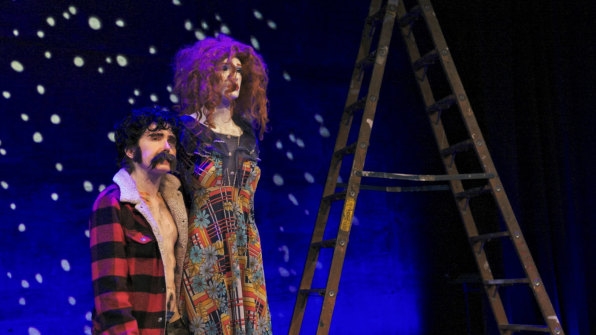Netflix’s ‘Nate’ is a comedy special about consent that’s as funny as it is uncomfortable
Most confrontational comedy shows only pick a fight with the viewer metaphorically.
At one point in Nate, however, an audience member is brought onstage and asked to sign a liability waiver before wrestling the star on a faded pink high school gym mat.
This is just one of many ways in which Nate, the audacious new Netflix special from Natalie Palamides, is as fluid with boundaries as it is with gender.
Nate is a clever deconstruction of toxic masculinity and consent that feels rather timely, despite the pre-COVID maskless physical interactivity. Palamides dresses in drag as the titular heartbroken d-bag, donning a shaggy handlebar mustache and mutton chops, saggy camo pants, and a fleece-lined lumberjacket over glued-on chest and belly hair so realistic, you can practically hear it clogging your shower drain. (It’s worth noting that Palamides performs topless the entire time, the casual nudity becoming less shocking by the minute.)
With a voice that’s both gravelly and high-pitched, like a Muppet who’s seen some things, Nate alternately enchants and repels his audience through a voyage of self-discovery. Our hero, we quickly learn, has just been broken up with, for reasons he doesn’t fully understand, and is now trying in earnest to determine what it means to be a man. His journey thrusts the audience deep inside Nate’s wild world, like the opposite of the part in Cats where the cats come out into the crowd, but for the whole play.
It’s a post-#MeToo comedy special that’s sure to find fans among Hannah Gadsby haters, since Nate is weirder and goofier, if every bit as confrontational.
We start with audience testimonials—including one from executive producer Amy Poehler—which run the gamut from bowled over to wigged out. It’s a fairly representative mix. Throughout the special, the camera lingers on the occasional horrified face of a ticket-holder who did not quite realize what they signed up for. Ordinarily, faces like those are the last thing a comic would want in their special; here, they qualify as compliments to the chef. If Palamides wanted to simply make her crowds guffaw, she would have made a different (worse) show. Instead, she has made one that briefly comes to a screeching halt until someone from the audience uneasily answers Nate’s pleas for his best friend, Lucas, and agrees to come onstage to towel off his just-showered friend’s enormous prosthetic penis.
(“Nobody dries me like you do, dude,” Nate tells the bemused “Lucas” as this is happening.)

Palamides starts training her audience early on that they’re not necessarily going to like doing the things they agree to do. After introducing the character through a gauntlet of hypercharged heteronormativity, including gurgling a cup of raw whey protein and spitting the powder into a flame, Palamides-as-Nate exhorts several audience members to let him grope them. Some agree, others do not. But this exercise reveals how proud Nate is for knowing that he has to ask before touching another person. Alpha cliché that he may be, Nate is trying his best and unsure of the results.
The complicated gender politics here fulfill the promise of the L.A.-based comedian’s earlier work, like the short video, Start Objectifying Women, from 2014. Since gravitating toward live solo shows, Palamides developed Nate at the Lyric Hyperion, a talent incubator that produced many other critically acclaimed shows, including Jamie Loftus’s Boss Whom Is Girl. Eventually, Palamides took Nate on the road, winning the Total Theatre Award at the 2018 Edinburgh Festival Fringe. Hers is the type of risk-taking art that doesn’t usually end up on Netflix, as loose and interactive as the Middleditch & Schwartz improvised specials from this past spring, but far more urgent, dynamic, and resonant. Perhaps Netflix will take more such chances if Nate ends up producing as much conversation as the show deserves.
By pressing play, viewers at home are not entering into the same contract that those attending in person did. There’s no chance that anyone among the couch-side crowd will have to sign a liability waiver. They may still feel that same queasy mix of discomfort and titillation as the live audience, however, like they, too, got more than they signed up for.
That feeling is the point.
(53)



